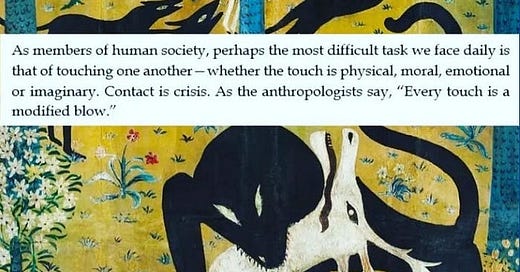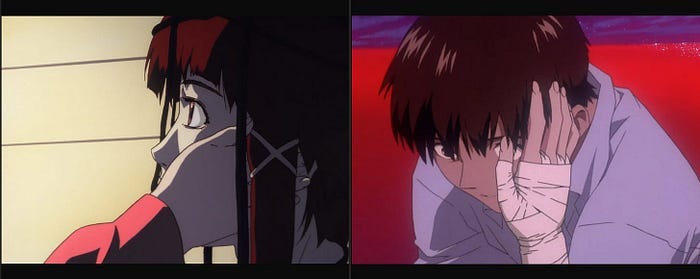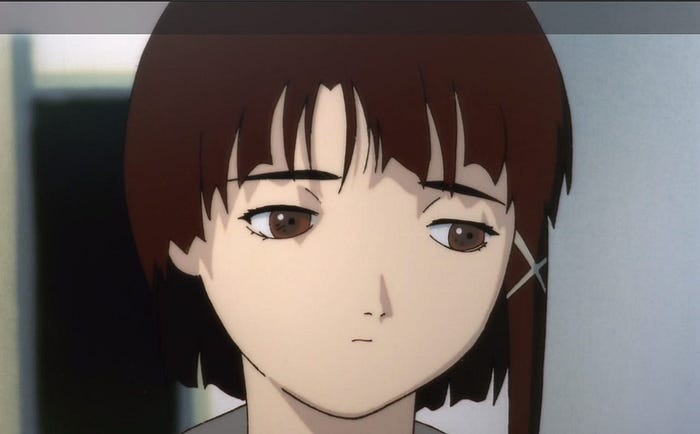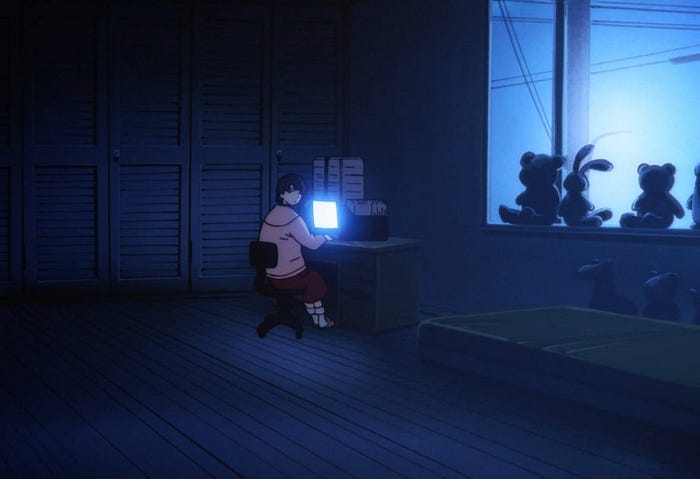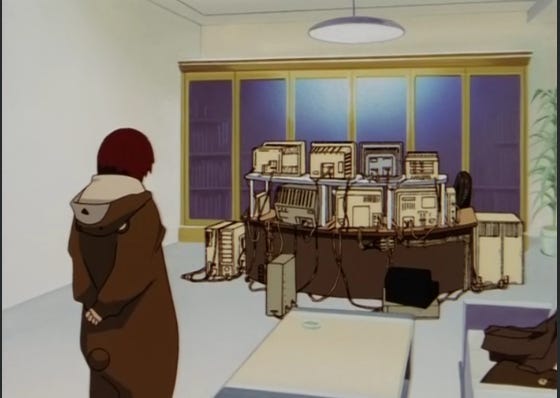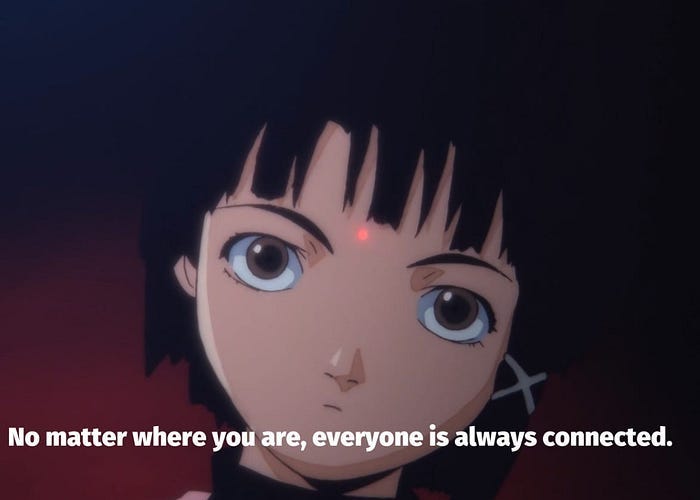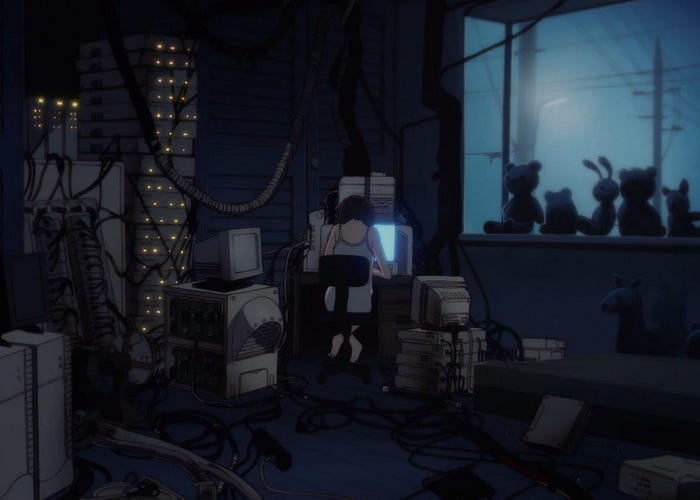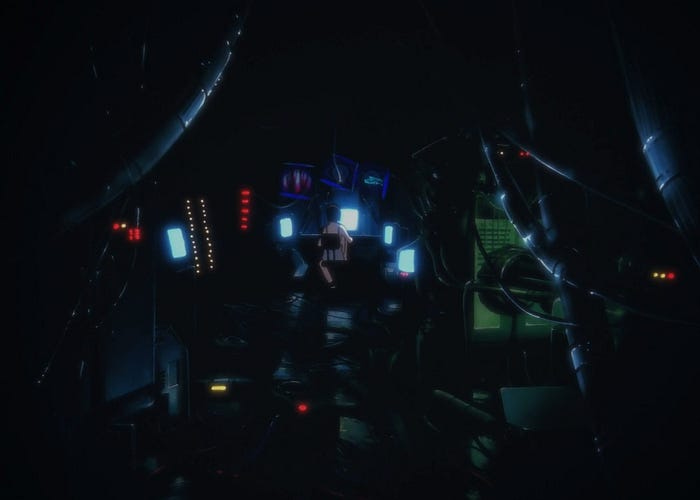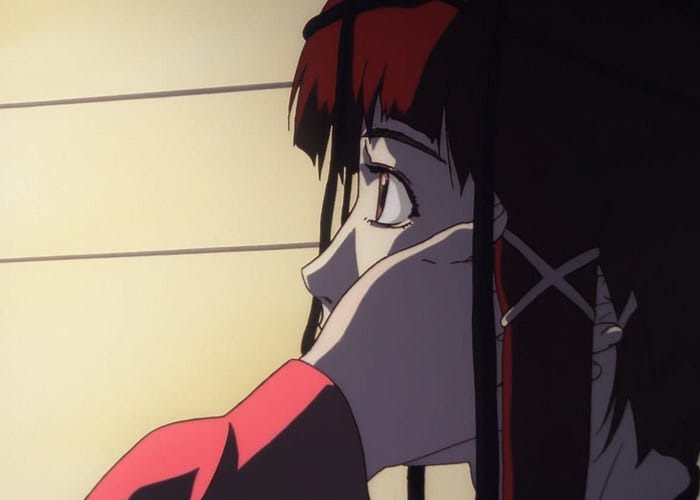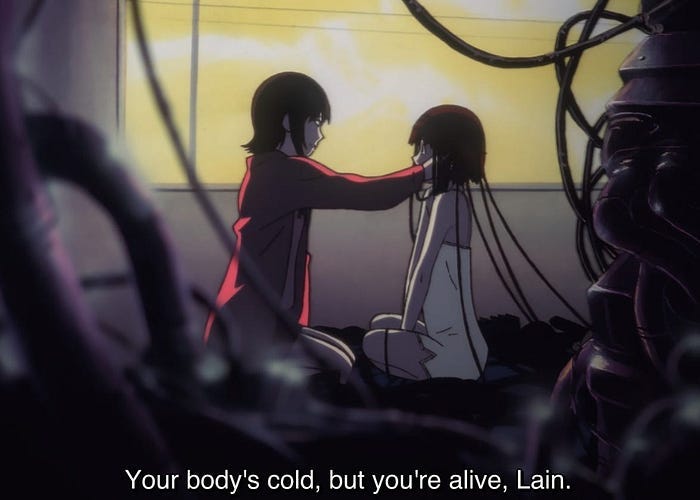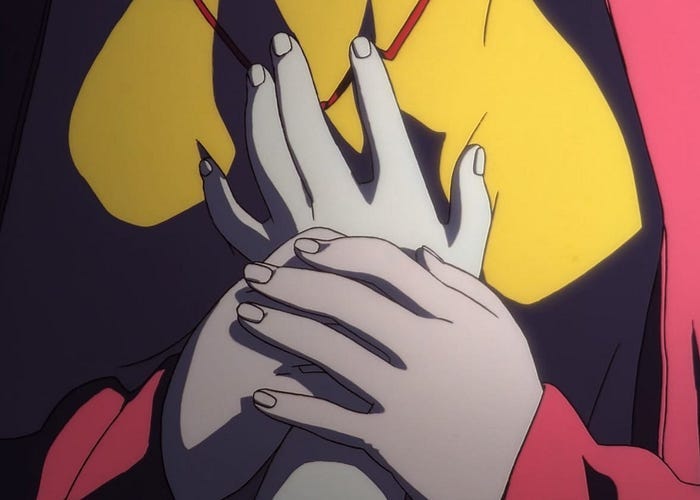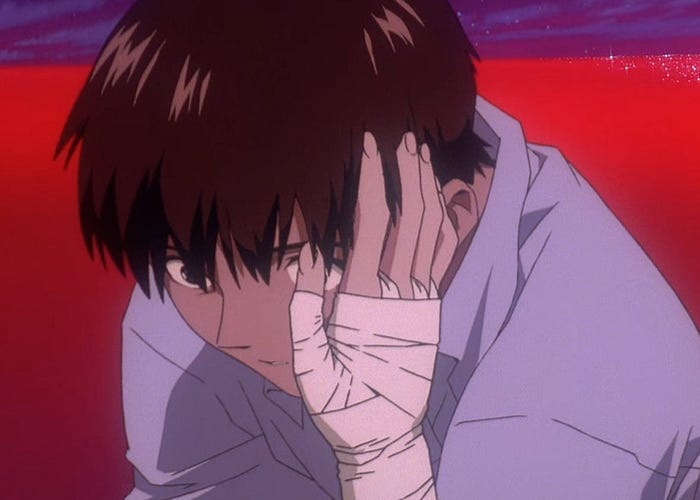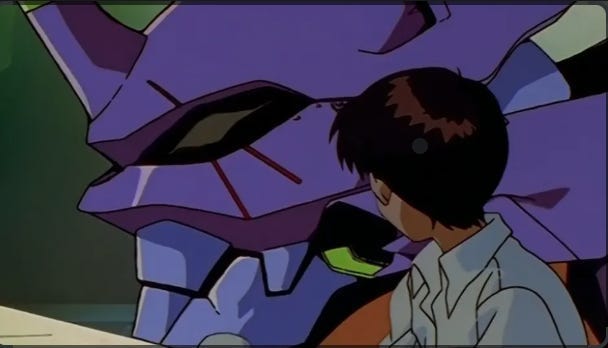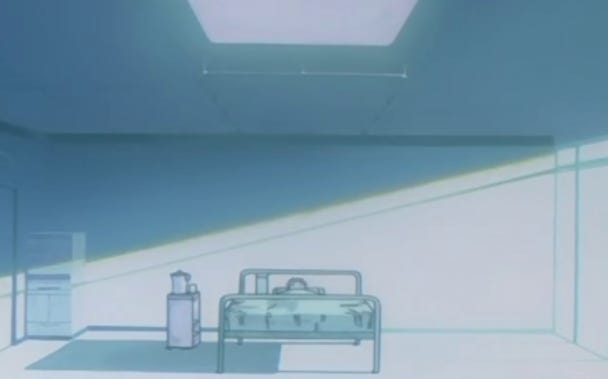the laying of hands and dis- and re-connection; or “every touch is a modified blow.”
(cw: mention of suicide, homicide) | 3500 words
Preamble
I’m going to just say at the start that this writing… “experiment” is probably going to be evolving over time and changing as I work on it more. I’m giving myself space to let this be whatever it is. For now, I am mostly trying to utilize it as an exercise to organize my thoughts in a written structure rather than what I end up doing, which is rambling to friends.
This doesn’t mean I’ll succeed at that, and I assume that a lot of this will be pretty stream-of-consciousness type writing, but I digress —
Major spoilers of the anime Serial Experiments Lain (13 episodes) follow, as well as discussion of the final scene of the End of Evangelion (original show is 26 episodes, film is 87 minutes). Obviously, if you’ve seen either of these, you’re golden. If you haven’t, I use the spoilers to give some context to the essay.
—
Contact is Crisis
Today, I want to write about these two scenes, the left from near the end of Serial Experiments Lain (1998) (you can watch this on Funimation or other means2) and the second from the final scene in the sequel-film End of Evangelion3 (1997) (you can watch the original 26 ep show and EoE on Netflix or other means…)
The intersection of these gestures, through the context of how they are made, their specificity, and even the way they are both come-to-God moments for the characters being touched. As the gestures being the same reply to either emotional withdrawal, or physical violence, there are likely similar feelings for the characters reaching out.
But first, we need some context to these scenes. I am probably going to go too deep into the weeds on Serial Experiments Lain, and even then, I’m going to avoid mentioning certain plot points and details to prevent myself from going on and on, but I give the basic thrust of the show. If it sounds interesting, there is still a reason to watch it, honestly. The way it is animated, shot, voice-acted, and generally portrayed is excellent. I’m a very picky anime watcher usually, and tend to prefer more psychological shows to more lighthearted ones (with some exceptions… like Jojo’s Bizarre Adventure) and it aligns with these preferences.
Context
Over the weekend, I finished the anime Serial Experiments Lain with two friends. I’ll try to give some setup here:
the story opens with a high school girl committing suicide and all her classmates receive email claiming to be her, and that she’s met God inside “The Wired” (think, the Internet, in 1998-cyberpunk-lite speak).
One of these classmates is the titular Lain, a very quiet and shy girl who prefers to keep to herself and stay out of social-situations in general. One of her classmates teases her that she should really “get on her email more” and Lain takes this advice to heart — the first thing she does when she returns home is boot up her (ostensibly) children’s PC, which immediately boots into the Wired and she reads the email from her classmate.
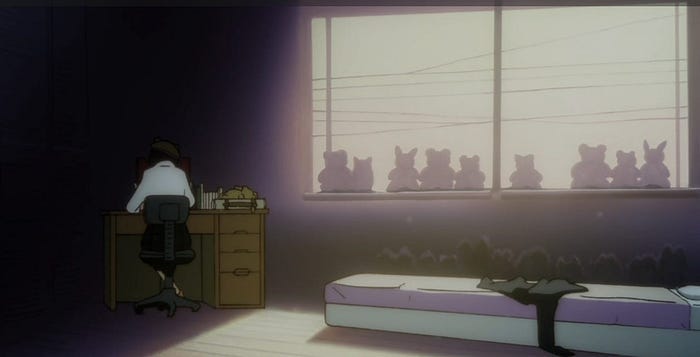
The classmate, a girl named Chisa Yomoda, has also emailed her with the claim that she has “abandoned her physical self” and that she has “met God in the Wired.”
This seems to… activate something in Lain. Although we won’t really know it yet.
She immediately goes to her father, a businessman who is just getting home to log onto his, what I like to call, “battle-station.”
Lain asks him to upgrade her Navi (her computer system) and he asks if she’s “finally caught the bug” and agrees. As he explains to Lain how the Wired connects everyone, and will be the future of civilization, he starts opening windows and screens on his computer with a visible maniacal grin.
I gotta say, so far, the tone and vibe of the show is pitch-perfect. It oozes dystopian cyberpunk, with a timeless air to it that makes even the CRT monitors seem un-aged.
Let’s talk about some more of that tone for a second.
I mentioned this in the caption for the images of Lain’s room, but the way the color palette is used and the way scenes are drawn is… vaguely upsetting and unsettling.
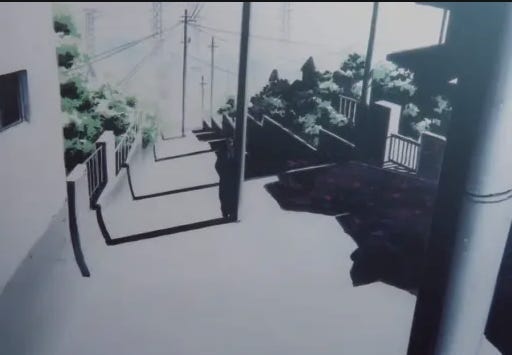
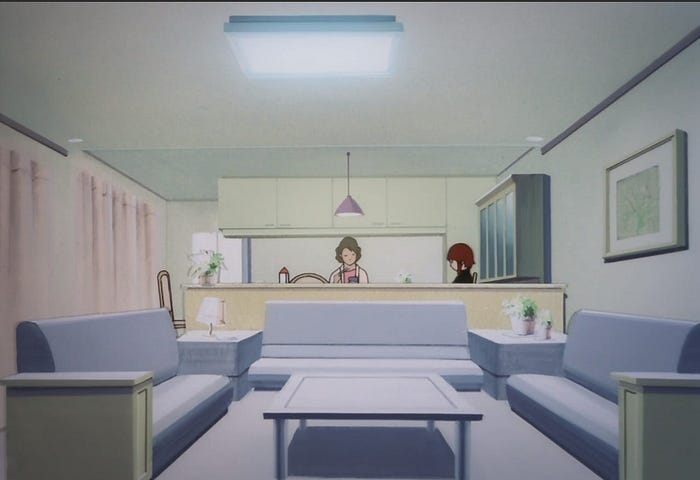
Back to the plot:
Her dad purchases a new computer for her and the delivery man drops it off the next day.
Later that night, on the invitation of her classmates, she goes to a club called Cyberia. There, a man we saw in a previous scene steal a bionic-looking drug capsule, (bear with me) kills two people with a handgun. He turns his attention to a paralyzed-with-fear Lain. She is urged to leave by her classmate, Arisu.
After he points his gun at Lain’s head, she approaches him. Her personality seems to shift in the moment, interrupting his apparently incoherent rambling, and she states the following:
“No matter where you are, everyone is always connected.”
Then he turns the gun on himself and shoots himself in the head.
The next day, she finds an envelope in her locker with a extremely high-powered computer modification chip in it. She approaches some kids at the Cyberia Cafe and they tell her how to use it, mentioning that it is a mod that lets your device fully-integrate into the Wired. Taro, one of the kids, even explains that his phone/personal-computer (I always find it interesting that these late ‘90s and early ‘00 cyberpunk shows never “invent” text messaging directly from their phones, they just use “email” on handheld devices. I guess that is an easier concept to ingest for viewers) could get Full-access to it if installed. Taro then comments that he’s seen Lain in the Wired before:
Lain asks: “Me? In the Wired?”
“But you look quite different. It’s common to assume a different character in the Wired, but yours is quite the opposite.”
She gets home, installs the modification into her computer, and she starts… getting really into computers.
I mean:
Really into computers. Manically so.
Her room, over the next 10 episodes, d/evolves into this monstrosity of wiring, coolant pipes, air conditioners, computers, and holographic screens. Her personality seems to begin to cycle in the real world between being outgoing and personable with her classmates and being withdrawn and antisocial. She ends up spending more and more time on her computer, eavesdropping on other users’ posts and blogs, diaries and cries for help. Every scene of her usage of the Wired is a kaleidoscope of color, an overlap of voices, and a series of bit-crushed images of empty streets, in the night and in the daytime. I assume, the implication here is she is browsing an early form of the Internet: Usenet (think of a very-early iteration of Reddit that was somehow more public).
Where is this going?
At this point, there seems to be some other Lain that exists in the Wired, perhaps even before she began using it. Her classmates mention seeing her at Cyberia the night before, as do the kids she runs into that explain the chip to her. There is some confusion whether it is Lain herself adopting a persona within her usage of the internet, or some other kind of spiritual-self. As we watch more of the show, things become more clear in some ways, and less clear in others.
It also depends on how you interpret the text. Is Lain a reliable narrator? Is she experiencing delusions, psychosis, schizophrenia? To be honest, I prefer to think she isn’t entirely, because the resulting ending is less decipherable, and I like to try and engage work where it is, rather than where I want-it-be. To me, hand-waiving the show’s entire plot as being the result of psychosis comes off too much like “it was all only a dream” but not in a neat Lynchian way.
Anyway. I want to talk about the ending now, lol.
The laying of hands
Near the end of the show, Lain is completely connected and integrated into the Wired. She’s implanted a Navi system into her body, and interfaces with it directly. She’s often found in her room, bundled under blankets, doing nothing but surfing the web. Searching for information. Among this information she finds throughout the show is an PSI-PC experiment that was attempted 15 years prior that attempted to utilize children’s natural (albeit low) frequency of psychic ability to synthesize it into a computer chip. Of course, it killed these kids in the process. (I could probably talk about the parallels between the scene she discovers this information and the 2015 video game Bloodborne in an entire other post though.)
Arisu comes looking for Lain, having not seen her at school in several days. She finds her and, tries to make contact with a nearly desolate and catatonic Lain, by touching her face:
Arisu then takes Lain’s hand and places it on her own chest, and tells her to feel her heart racing.
Now, onto End of Evangelion real quick.
At the End of Evangelion, the protagonist, Shinji, has just emerged from a sea of consciousness, retaking his physical form to return to his ego-centric humanity. There is an implication that there is value in being apart from the collective, that isn’t possible to replicate within it. He emerges onto a beach, empty. He erects some grave markers and seemingly two weeks pass alone. Until his rival, friend, roommate, and fellow Eva pilot Asuka Soryu appears on the beach, laying on her back, dressed in her plugsuit (the plugsuit is part of the Evangelion mech pilot’s uniform, it increases the pilot’s ability to neurally and physically interface with the machine while piloting) seemingly unconscious: His mind seems to reel, and the generally accepted interpretation is that he is overwhelmed and trying to determine if she is real or not. (You can spend hours reading about different interpretations of events of almost any and all scenes in the Eva Geeks wiki).
As he lays his hands on her neck and begins squeezing, she doesn’t seem to react at first. Then, she slowly reaches up and strokes his face affectionately. He immediately stops and breaks down sobbing, his tears falling onto her face. She then says the last line of the movie, dependent on translation: kimochi warui (気持ち悪い), which can be translated as “I feel sick” or “How disgusting.” The film ends.
There is the incredible similarity to the same “modified blow” gesture in how Asuka touches Shinji’s face and how Arisu holds Lain’s face in Serial Experiments Lain.
This laying-of-hands. In both instances, the characters that are touched at at their very limit: emotionally, physically, or let’s say, psychically. Asuka’s reply to Shinji’s violence is not violence of her own, but an acceptance of him as Another. A warm welcoming, a return-to-home.
This reply, this come-to-god moment, breaks him of his psychosis. He relents. He breaks down sobbing, his tears falling onto Asuka’s face.
In Lain’s case, her response to the contact is to reconnect with her humanity. Her physical self. For the last half of this show, she has withdrawn more and more.
These are driving themes in both shows: disconnection and re-connection to the self, to humanity, to the collective unconscious. The reasons both characters drive themselves to disconnect and withdraw is almost always just a lack in the first place — they don’t know how, so they’re more comfortable being with themselves. At least then, they don’t have to worry so much about their inability to be fully authentic with people. But being alone is only a salve, because you’re constantly being reminded of this lack with your loneliness. Worse, in both cases, they withdraw because their attempts to connect is met with violence.
When Shinji first shows up at NERV headquarters after a summons from his estranged father, he expects a warm, or maybe awkward reunion, and is instead driven into a machine (mostly guilt-tripped really) that puts him in the hospital. During the process he experiences overwhelming pain,(since he is weakly neurally-linked to the Eva unit), where he feels his forearm get snapped in two (the creature he’s engaged in combat with does this to his mech and the pain is transmitted to the pilot).
Eventually, he is knocked out during the fight and wakes up in a hospital, with only a foggy memory of the events leading up to the resuscitation.
In Lain’s case, when she tries to go out to Cyberia with her classmates, she gets a gun pointed at her and watches three people die. Later, she is manipulated by a false-God within the Wired whom she eventually destroys. (This is a whole thing. I kind of gloss over it in the synopsis because it’s pretty far in and not worth discussing in super in-depth detail, for the purpose of this essay. This show… goes places).
She ends up returning to her withdrawn state, utilizing the safety of the Wired to protect herself from further harm, as much as that is possible.
When I was a kid, my middle school life was basically “no connection” to anyone. I was the weirdest kid, in a bad way. Not even getting into the weird family situation I had going on at the time following my parents’ divorce (addiction, etc).
I eventually did what Lain did, and withdrew into MMORPGs and video games, and coasting through classes and social engagements.
Meanwhile my sister reacted in a somewhat opposite direction — becoming a perfectionist and socialite. While my attempts to connect weren’t really met with violence, there is likely a similar undercurrent to why Evangelion hit the way it did for me when I was in high school, and why Lain feels so eerily familiar to me as an adult.
It’s compelling to me, the reactions people have to Shinji, in particular, when they are kids or when they are adults. A lot of people will react with disdain toward his behavior, calling him whiny or annoying. But the thing is, he’s 14. Of course he’s a coward. We all were. To expect him to react to an essential guilt-trip/hostage situation and rise-to-meet the challenge is unhinged.
Nowadays, I have a wide swath of friendships and relationships with a ton of people. A self-proclaimed hyper-extrovert, I enjoy spending time talking and chatting with people every day of the week if I can manage it. Of course, some of this is partially due to feeling a vague sense of fomo, but otherwise, it’s just how I enjoy spending my time — people are so varied, interesting and constantly changing.
There’s a dynamism to socially connecting with people that can’t really be compared to anything else. There’s hardly any “getting better,” at it in a structured way, there’s no “endgame” or “plateau,” it just constantly evolves, changes color and texture, and mechanisms.
A lot of hobbies and stuff can be somewhat unstructured, but there’s something else to conversation. Getting to know people, feeling out social vibes, learning about them, and yourself. Connection is the ultimate part of being human, and there’s a whole another conversation for another day about what it means to be physical.
When I was younger, I used to fantasize about some kind of escape into a robotic body, whether that was some kind of machine consciousness uploading or other-thing. But, I think there is so much lost to the phenomena of being human that would be destroyed in such a process. Without this sense of connection, or contact, with people, we would completely and utterly lose ourselves to that ether.
I hate to admit it, but growing up in a high school with 200 kids, 97% being boys, almost fucking ruined me socially, emotionally, and psychologically. It wasn’t even about being bullied or anything either really, but it was a lack of some honest connection to other people. If I had grown up in the hyper-internet like nowadays, I probably… would have become like an incel or something.
But I owe a lot to the relationships I made with young men when I was younger, the real ones, and to the kindness and patience of the people (and especially the most generous and incredible women I’ve ever met) throughout my life then and since. I’m always in awe of the kind of people I’ve been able to bring into my life and the kinds of relationships I’ve been able to build, maintain, and live-inside with such amazing people. Likely, if you’re reading this near it’s publishing date, you’re among that crowd. Thank you.
And for real, if you’ve read all this, thank you. I didn’t really go in with a master plan or script here, but it was enjoyable to create. I hope it was enjoyable to read.
Connection is vital. It’s everything, to me.
I ask you then, what does it mean to you to connect?
Finally, I leave you with this vaguely unrelated poem I wrote recently, cause I just feel like dumping it here. Also, I literally don’t know how to make “a small thing” vs “a big thing”:
“the halo–
no mere incandescence–
is the brand of the horribly fucked,
the soon-to-be-devoured.”maybe divinity isn’t a state, but an action?
an ushering forth; a birthing.it takes time.
it takes sacrifice.
it takes everything-you-have.the hand-sized mechanism has a gravity to it,
a heaviness in the hand that makes it feel
authentic, a revelation and inspiration to its intelligent design:
more real than yourself.holiness between thy bleached teeth,
you clench as you place the device onto yourself —
it’s gold teeth drive through
thy trans-dermal layer of skin,
attaching themselves to linkages already
buried within.
this is a binding: to the nervous system;
slaking its need off the Potassium–Sodium nervous channels,
creating a subtle
feedback loop.this system is built to add,
to amplify,
to multiply,
the wearer’s memory, to perfect it into a
crystalline, holographic, clear-eyed image.no longer a domain of the blessed or damned,
it is a curse that can be adorned,
a golden, titanium crown —
a transformation of the self intosomething more Perfect.
something more Real.
something Beyond.

